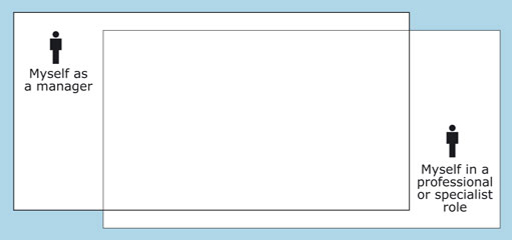7 Transition into management
Ironically, the same skills that helped individuals to become managers may prevent them from becoming an effective manager. One of the most common reasons for promoting someone to managerial status is that he or she has excelled as a ‘player’. Most sales managers have been very successful salespeople, most production managers have worked well on the shop-floor, most office managers have been very good secretaries or administrators. Presumably, the rationale is that if you can do it well, you can manage it equally well. While the majority of managers find the transition to a managerial position stimulating (if stressful at times), some find it more difficult. The reason is usually that they find it difficult to stop doing their previous job. They continue to ‘play’ rather than manage. They try to retain some of the roles they did well as operators, and this can reduce their effectiveness as managers.
This problem is known as the player–manager syndrome. Understanding the syndrome may help you to change your roles, or help other managers to be more effective. In some jobs, there is a complete break when a person moves from operating to managing. For instance, not many airline managers continue to fly aeroplanes. However, in many management jobs a certain amount of operating is still needed. There may be expectations in your organisation that you should continue in some of your former operating roles. When changing to a management job it is important to consider whether time spent operating improves or damages your management role. You may want to use the opportunity to change the emphasis of your work so that it is more about your management role and fits into your available time more easily.
Some of the reasons people give for finding it hard to stop doing their old role and adjust to the new one are set out below. Solutions are also suggested on the kinds of adjustments you can make.
- It is important to keep my specialist skills up-to-date. You can maintain your skills by guiding, teaching or coaching in order to perfect someone else’s technique. This helps your team members to develop new competences.
- I believe it helps my leadership image if I show that I can perform as well as any of my staff and can do anything I ask them to do. Your leadership and ability to perform to a high standard will be better demonstrated by sharing management issues with your staff. Share with them how the objectives could be set, how to plan and organise them, how to set up a control mechanism and how to evaluate the achievement. This develops valuable project management skills in your team.
- My staff expect me to remain ‘one of them’. If you share with your staff aspects of your managerial thinking – its planning, organisation and coordination – you’ll demonstrate the particular contribution you are making to the team effort.
- I feel more secure and comfortable doing something I know I can do well. By doing tasks which are within the capabilities of your staff, you could be denying them the opportunity to gain the experience.
- I believe it is often quicker and easier to do the job myself than leave it to somebody who cannot do it so well. Helping others to learn yields benefits in the long run. Take every opportunity to develop your staff, and do this in a planned fashion.
- I need to carry out work myself because I don’t have enough people to do the job. When there are unexpected staff shortages or sudden demand, for example, you may need to respond by doing the job yourself. But who will be managing while you are performing? If a staff shortage is long-standing you will need to try to get extra resources or to reduce the levels of activity. When times are difficult your team needs you to plan work activities, to be an effective figurehead and spokesperson for your department and to influence decisions taken elsewhere.
- My manager gets very involved and expects me to do so as well. This is a difficult situation to deal with because it may involve trying to influence the attitude of the person who manages you. However, it is important to demonstrate your effectiveness as a manager if you are able to. This includes giving evidence of the value of your contributions to planning and budgeting; the effectiveness of your control systems; and your interest in, and influence on, job design, the motivation of your staff and morale in your department. By doing the job yourself you will not demonstrate your qualities as a manager unless you are able to manage the work of your team in addition to your own work.
- My job is largely functional and involves a good deal of operating as well as managing. If you are a manager who maintains a professional role or particular specialism, you must spend some time on it. But the functions of manager and professional or specialist functional leader overlap a good deal, as is suggested in Figure 1.
Many people like to spend their time and energy operating rather than managing. Operating is often easier and more rewarding than managing, and it is usually less demanding and carries fewer risks. However, you need to maintain the right balance. To do this you need to be able to separate operating and managing very clearly. New managers can find the transition difficult. Older managers may have failed to make the transition.

